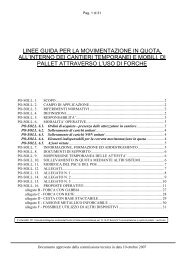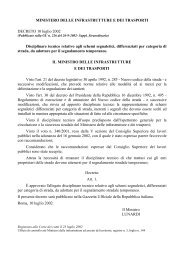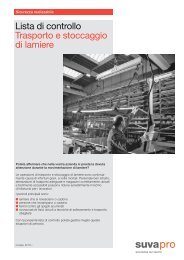- Page 1:
RICONQUISTARE IL PAESAGGIO La Conve
- Page 5 and 6:
A cura di: Corrado Teofili e Rosa C
- Page 8 and 9:
Sommario Presentazione, di Enzo Ven
- Page 10 and 11:
Presentazione di Enzo Venini Presid
- Page 12:
Riconquistare il paesaggio diversi
- Page 15 and 16:
14 NOTA DEI CURATORI gi uno dei pi
- Page 17 and 18:
16 NOTA DEI CURATORI mente in “se
- Page 19 and 20:
18 INTRODUZIONE Ma ora, all’inizi
- Page 21 and 22:
20 INTRODUZIONE I tecnici dell’Is
- Page 23 and 24:
22 INTRODUZIONE delle falesie a str
- Page 25 and 26:
24 INTRODUZIONE tro di ricerche eco
- Page 27 and 28:
26 INTRODUZIONE Bibliografia Gianfr
- Page 29 and 30:
28 CAPITOLO 1 - La Convenzione Euro
- Page 31 and 32:
30 CAPITOLO 1 - La Convenzione Euro
- Page 33 and 34:
32 CAPITOLO 1 - La Convenzione Euro
- Page 35 and 36:
34 CAPITOLO 1 - La Convenzione Euro
- Page 37 and 38:
36 CAPITOLO 1 - La Convenzione Euro
- Page 39 and 40:
38 CAPITOLO 1 - La Convenzione Euro
- Page 41 and 42:
40 CAPITOLO 1 - La Convenzione Euro
- Page 43 and 44:
42 CAPITOLO 1 - La Convenzione Euro
- Page 45 and 46:
44 CAPITOLO 1 - La Convenzione Euro
- Page 47 and 48:
46 CAPITOLO 1 - La Convenzione Euro
- Page 49 and 50:
48 CAPITOLO 1 - La Convenzione Euro
- Page 51 and 52:
50 CAPITOLO 1 - La Convenzione Euro
- Page 53 and 54:
52 CAPITOLO 1 - La Convenzione Euro
- Page 55 and 56:
54 CAPITOLO 1 - La Convenzione Euro
- Page 57 and 58:
56 CAPITOLO 1 - La Convenzione Euro
- Page 59 and 60:
58 CAPITOLO 1 - La Convenzione Euro
- Page 61 and 62:
60 CAPITOLO 1 - La Convenzione Euro
- Page 63 and 64:
62 CAPITOLO 1 - La Convenzione Euro
- Page 65 and 66:
64 CAPITOLO 1 - La Convenzione Euro
- Page 67 and 68:
66 CAPITOLO 1 - La Convenzione Euro
- Page 69 and 70:
68 CAPITOLO 1 - La Convenzione Euro
- Page 71 and 72:
70 CAPITOLO 1 - La Convenzione Euro
- Page 73 and 74:
72 CAPITOLO 1 - La Convenzione Euro
- Page 75 and 76:
74 CAPITOLO 1 - La Convenzione Euro
- Page 77 and 78:
76 CAPITOLO 1 - La Convenzione Euro
- Page 79 and 80:
78 CAPITOLO 1 - La Convenzione Euro
- Page 81 and 82:
80 CAPITOLO 1 - La Convenzione Euro
- Page 83 and 84:
82 CAPITOLO 1 - La Convenzione Euro
- Page 85 and 86:
84 CAPITOLO 1 - La Convenzione Euro
- Page 87 and 88:
86 CAPITOLO 1 - La Convenzione Euro
- Page 89 and 90:
88 CAPITOLO 1 - La Convenzione Euro
- Page 91 and 92:
90 CAPITOLO 1 - La Convenzione Euro
- Page 93 and 94:
92 CAPITOLO 1 - La Convenzione Euro
- Page 95 and 96:
94 CAPITOLO 1 - La Convenzione Euro
- Page 97 and 98:
96 CAPITOLO 1 - La Convenzione Euro
- Page 99 and 100:
98 CAPITOLO 1 - La Convenzione Euro
- Page 101 and 102:
100 CAPITOLO 1 - La Convenzione Eur
- Page 103 and 104:
102 CAPITOLO 1 - La Convenzione Eur
- Page 105 and 106:
104 CAPITOLO 1 - La Convenzione Eur
- Page 107 and 108:
106
- Page 109 and 110:
108 CAPITOLO I1 - La percezione del
- Page 111 and 112:
110 CAPITOLO I1 - La percezione del
- Page 113 and 114:
112 CAPITOLO I1 - La percezione del
- Page 115 and 116:
114 CAPITOLO I1 - La percezione del
- Page 117 and 118:
116 CAPITOLO I1 - La percezione del
- Page 119 and 120:
118 CAPITOLO I1 - La percezione del
- Page 121 and 122:
120 CAPITOLO I1 - La percezione del
- Page 123 and 124:
122 CAPITOLO I1 - La percezione del
- Page 125 and 126:
124 CAPITOLO I1 - La percezione del
- Page 127 and 128:
126 CAPITOLO I1 - La percezione del
- Page 129 and 130:
128 CAPITOLO I1 - La percezione del
- Page 131 and 132:
130 CAPITOLO I1 - La percezione del
- Page 133 and 134:
132 CAPITOLO I1 - La percezione del
- Page 135 and 136:
134 CAPITOLO I1 - La percezione del
- Page 137 and 138:
136 CAPITOLO I1 - La percezione del
- Page 139 and 140:
138 CAPITOLO I1 - La percezione del
- Page 141 and 142:
140 CAPITOLO I1 - La percezione del
- Page 143 and 144:
142 CAPITOLO I1 - La percezione del
- Page 145 and 146:
144 CAPITOLO I1 - La percezione del
- Page 147 and 148:
146 CAPITOLO I1 - La percezione del
- Page 149 and 150:
148 CAPITOLO I1 - La percezione del
- Page 151 and 152:
150 CAPITOLO I1 - La percezione del
- Page 153 and 154:
152 CAPITOLO III - Paesaggi d’Ita
- Page 155 and 156:
154 CAPITOLO III - Paesaggi d’Ita
- Page 157 and 158:
156 CAPITOLO III - Paesaggi d’Ita
- Page 159 and 160:
158 CAPITOLO III - Paesaggi d’Ita
- Page 161 and 162:
160 CAPITOLO III - Paesaggi d’Ita
- Page 163 and 164:
162 CAPITOLO III - Paesaggi d’Ita
- Page 165 and 166:
164 CAPITOLO III - Paesaggi d’Ita
- Page 167 and 168:
166 CAPITOLO III - Paesaggi d’Ita
- Page 169 and 170:
168 CAPITOLO III - Paesaggi d’Ita
- Page 171 and 172:
170 CAPITOLO III - Paesaggi d’Ita
- Page 173 and 174:
172 CAPITOLO III - Paesaggi d’Ita
- Page 175 and 176:
174 CAPITOLO III - Paesaggi d’Ita
- Page 177 and 178:
176 CAPITOLO III - Paesaggi d’Ita
- Page 179 and 180:
178 CAPITOLO III - Paesaggi d’Ita
- Page 181 and 182:
180 CAPITOLO III - Paesaggi d’Ita
- Page 183 and 184:
182 CAPITOLO III - Paesaggi d’Ita
- Page 185 and 186:
184 CAPITOLO III - Paesaggi d’Ita
- Page 187 and 188:
186 CAPITOLO III - Paesaggi d’Ita
- Page 189 and 190:
188 CAPITOLO III - Paesaggi d’Ita
- Page 191 and 192:
1 190 CAPITOLO III - Paesaggi d’I
- Page 193 and 194:
192 CAPITOLO III - Paesaggi d’Ita
- Page 195 and 196:
194 5 CAPITOLO III - Paesaggi d’I
- Page 197 and 198:
196 CAPITOLO III - Paesaggi d’Ita
- Page 199 and 200:
198 CAPITOLO III - Paesaggi d’Ita
- Page 201 and 202:
200 CAPITOLO III - Paesaggi d’Ita
- Page 203 and 204:
202 CAPITOLO III - Paesaggi d’Ita
- Page 205 and 206:
204 CAPITOLO III - Paesaggi d’Ita
- Page 207 and 208:
206 CAPITOLO III - Paesaggi d’Ita
- Page 209 and 210:
208 CAPITOLO III - Paesaggi d’Ita
- Page 211 and 212:
210 CAPITOLO III - Paesaggi d’Ita
- Page 213 and 214:
212 CAPITOLO III - Paesaggi d’Ita
- Page 215 and 216:
214 CAPITOLO III - Paesaggi d’Ita
- Page 217 and 218:
216 CAPITOLO III - Paesaggi d’Ita
- Page 219 and 220:
218
- Page 221 and 222:
220 CAPITOLO IV - Paesaggio, territ
- Page 223 and 224:
222 CAPITOLO IV - Paesaggio, territ
- Page 225 and 226:
224 CAPITOLO IV - Paesaggio, territ
- Page 227 and 228:
226 CAPITOLO IV - Paesaggio, territ
- Page 229 and 230:
228 CAPITOLO IV - Paesaggio, territ
- Page 231 and 232:
230 CAPITOLO IV - Paesaggio, territ
- Page 233 and 234:
232 CAPITOLO IV - Paesaggio, territ
- Page 235 and 236:
234 CAPITOLO IV - Paesaggio, territ
- Page 237 and 238:
236 CAPITOLO IV - Paesaggio, territ
- Page 239 and 240:
238 CAPITOLO IV - Paesaggio, territ
- Page 241 and 242:
240 CAPITOLO IV - Paesaggio, territ
- Page 243 and 244:
242 CAPITOLO IV - Paesaggio, territ
- Page 245 and 246:
244 CAPITOLO IV - Paesaggio, territ
- Page 247 and 248:
246 CAPITOLO IV - Paesaggio, territ
- Page 249 and 250:
248 CAPITOLO IV - Paesaggio, territ
- Page 251 and 252:
250 CAPITOLO IV - Paesaggio, territ
- Page 253 and 254:
252 CAPITOLO IV - Paesaggio, territ
- Page 255 and 256:
254 CAPITOLO IV - Paesaggio, territ
- Page 257 and 258:
256 CAPITOLO IV - Paesaggio, territ
- Page 259 and 260:
258 CAPITOLO IV - Paesaggio, territ
- Page 261 and 262:
260 CAPITOLO IV - Paesaggio, territ
- Page 263 and 264:
262 CAPITOLO IV - Paesaggio, territ
- Page 265 and 266:
264 CAPITOLO IV - Paesaggio, territ
- Page 267 and 268:
266 CAPITOLO IV - Paesaggio, territ
- Page 269 and 270:
268 CAPITOLO IV - Paesaggio, territ
- Page 271 and 272:
270 CAPITOLO IV - Paesaggio, territ
- Page 273 and 274:
272 CAPITOLO IV - Paesaggio, territ
- Page 275 and 276:
274 CAPITOLO IV - Paesaggio, territ
- Page 277 and 278:
276 CAPITOLO IV - Paesaggio, territ
- Page 279 and 280:
278 CAPITOLO IV - Paesaggio, territ
- Page 281 and 282:
280 CAPITOLO IV - Paesaggio, territ
- Page 283 and 284:
282 CAPITOLO IV - Paesaggio, territ
- Page 285 and 286:
284 CAPITOLO IV - Paesaggio, territ
- Page 287 and 288:
286 CAPITOLO IV - Paesaggio, territ
- Page 289 and 290:
288 CAPITOLO IV - Paesaggio, territ
- Page 291 and 292:
290 CAPITOLO IV - Paesaggio, territ
- Page 293 and 294:
292 CAPITOLO IV - Paesaggio, territ
- Page 295 and 296:
294 CAPITOLO IV - Paesaggio, territ
- Page 297 and 298: 296 CAPITOLO IV - Paesaggio, territ
- Page 299 and 300: 298 CAPITOLOV - Paesaggi e partecip
- Page 301 and 302: 300 CAPITOLOV - Paesaggi e partecip
- Page 303 and 304: 302 CAPITOLOV - Paesaggi e partecip
- Page 305 and 306: 304 CAPITOLOV - Paesaggi e partecip
- Page 307 and 308: 306 CAPITOLOV - Paesaggi e partecip
- Page 309 and 310: 308 CAPITOLOV - Paesaggi e partecip
- Page 311 and 312: 310 CAPITOLOV - Paesaggi e partecip
- Page 313 and 314: 312 CAPITOLOV - Paesaggi e partecip
- Page 315 and 316: 314 CAPITOLOV - Paesaggi e partecip
- Page 317 and 318: 316 CAPITOLOV - Paesaggi e partecip
- Page 319 and 320: 318 CAPITOLOV - Paesaggi e partecip
- Page 321 and 322: 320 CAPITOLOV - Paesaggi e partecip
- Page 323 and 324: 322 CAPITOLOV - Paesaggi e partecip
- Page 325 and 326: 324 CAPITOLOV - Paesaggi e partecip
- Page 327 and 328: 326 CAPITOLOV - Paesaggi e partecip
- Page 329 and 330: 328 CAPITOLOV - Paesaggi e partecip
- Page 331 and 332: 330 CAPITOLOV - Paesaggi e partecip
- Page 333 and 334: 332 CAPITOLOV - Paesaggi e partecip
- Page 335 and 336: 334 CAPITOLOV - Paesaggi e partecip
- Page 337 and 338: 336 CAPITOLOV - Paesaggi e partecip
- Page 339 and 340: 338 CAPITOLOV - Paesaggi e partecip
- Page 341 and 342: 340 CAPITOLOV - Paesaggi e partecip
- Page 343 and 344: 342 CAPITOLOV - Paesaggi e partecip
- Page 345 and 346: 344 CAPITOLOV - Paesaggi e partecip
- Page 347: 346 CAPITOLOV - Paesaggi e partecip
- Page 351 and 352: 350 CAPITOLOV - Paesaggi e partecip
- Page 353 and 354: 352 CAPITOLOV - Paesaggi e partecip
- Page 355 and 356: 354 CAPITOLOV - Paesaggi e partecip
- Page 357 and 358: 356 CAPITOLOV - Paesaggi e partecip
- Page 359 and 360: 358 CAPITOLOV - Paesaggi e partecip
- Page 361 and 362: 360 CAPITOLOV - Paesaggi e partecip
- Page 363 and 364: 362 CAPITOLOV - Paesaggi e partecip
- Page 365 and 366: 364 CAPITOLOV - Paesaggi e partecip
- Page 367 and 368: 366 Makhzoumi, J. and Pungetti G.,
- Page 370: La Convenzione Europea sul Paesaggi





